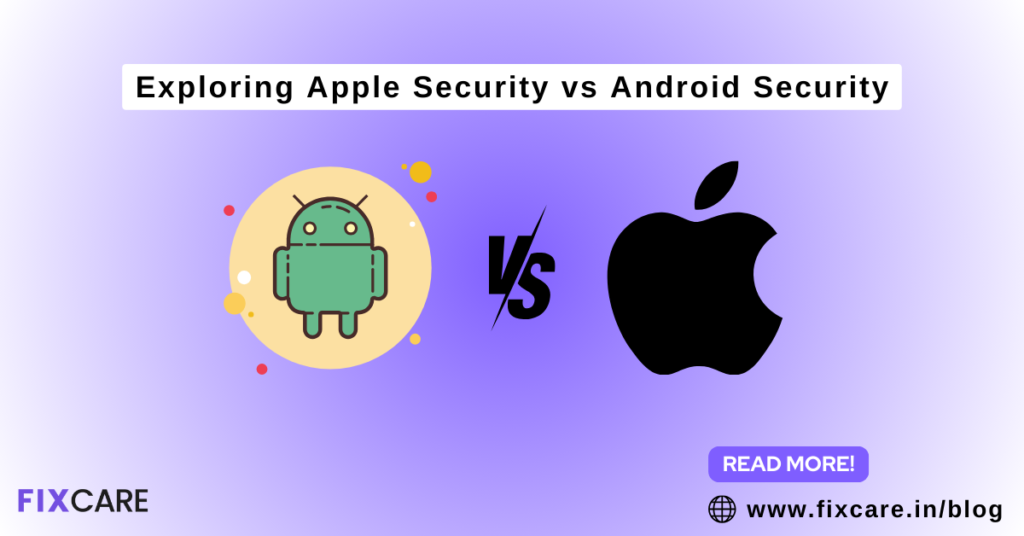
Navigating the Fortresses: Exploring Apple Security vs Android Security

Table of Contents
The struggle for dominance in the rapidly changing field of mobile technology involves more than simply slick features and cutting-edge designs—security is a key factor. The two titans of the smartphone market, apple security vs android security, have fortified their strongholds with formidable security protocols. We’ll explore the domains of apple security vs android security
in this post, analyzing the tactics, advantages, and possible drawbacks of each system.
The Foundations: Apple Security
Apple’s closed ecosystem and strict control over its software and hardware have earned it accolades for a long time. The combination of software and hardware offers a level of protection that is frequently regarded as unparalleled.
End-to-End Encryption:
End-to-end encryption is a cornerstone of Apple’s strong privacy stance. This makes it harder for unauthorized parties to intercept sensitive information by guaranteeing that only the intended receiver can decrypt and read communications.
software Store Vigilance:
Before making any software available to users, Apple carefully reviews it, making the App Store a strictly regulated marketplace. By using this method, the likelihood of harmful apps entering the ecosystem is greatly decreased. in this blog, analyzing the tactics, advantages, and possible drawbacks of each system.
Touch ID and Face ID:
By adding an additional layer of security, biometric authentication techniques like Touch ID and Face ID make it more difficult for unauthorized users to access the device.
Frequent Software upgrades:
Apple is dedicated to delivering software upgrades on time, which not only adds new functionality but also quickly addresses security flaws. By doing this, consumers are guaranteed protection from new threats.
The Android Frontier:
Because it is an open-source platform, Android takes a different tack, giving customers greater customization possibilities but necessitating an alternative security plan.
Diverse Ecosystem:
While the vast array of Android-powered devices adds to the platform’s appeal, it also presents a problem for standard security protocols. Android must traverse the varied environment of manufacturers and their variants, in contrast to Apple, where hardware and software are tightly linked.
Google Play Protect:
Google Play Protect is the company’s answer to app security. This tool periodically searches the Google Play Store for potentially dangerous apps and removes them.
Permissions System:
Android’s permission system gives users fine-grained control over the data that applications are permitted to access. The objective of this transparency is to enable consumers to make knowledgeable decisions regarding their privacy.
Difficulties with Fragmentation:
Although Android’s open architecture encourages creativity, it also leads to fragmentation. Older Android-powered devices might not receive the most recent security upgrades, which could lead to a vulnerability.
The Battlefront:
Threats from malware and security:
One important difference between apple security vs android security is how common malware is. Android users should exercise greater caution when installing apps from third-party sources, even if Apple’s closed environment and App Store review process lower the chance of malware.
Phishing Attacks:
Phishing attacks are a problem for both platforms. To some extent, this risk is reduced, though, by Apple’s strict app review procedure and closed environment.
Biometric Authentication Wars:
The conflict between Android smartphones’ fingerprint and facial recognition features and Apple devices’ Touch ID and Face ID adds an interesting dimension to the security analysis.
The Future of Security:
The threats are evolving along with technology. In the race for security, apple security vs android security both make a constant effort to stay one step ahead.
Emerging Technologies:
Mobile security is about to undergo a radical change because to the integration of technologies like artificial intelligence and machine learning. To improve their threat detection skills, Apple and Android are both making investments in these fields.
Privacy Issues:
Privacy is still a major concern, and both platforms are coming under more and more pressure to offer stronger and more visible privacy protections. The future of mobile security is likely to be shaped by the ongoing discussion about user data collecting and its ethical ramifications.
Conclusion:
Regarding the security differences between apple security vs android security, both systems have built strongholds. Android’s open architecture allows for freedom and diversity, while Apple’s closed ecosystem and rigorous management offer a sense of security. Individual choices, objectives, and how users strike a careful balance between security and customization ultimately determine which option is best. The competition for dominance in the field of mobile security will surely continue as technology develops, and consumers may anticipate even more advanced defenses in the years to come.
Recent Blogs





Top 7 Signs You Need an iPhone Screen Replacement Today




Top 10 Fixes When Your iPhone Volume Buttons Not Working



Rain Damaged iPhone? Here’s What to Do Immediately
Get your Device Repaired Today
Recent News

Top 5 Signs You Need a Back iPhone Glass Replacement




Top 7 Signs You Need an iPhone Screen Replacement Today


